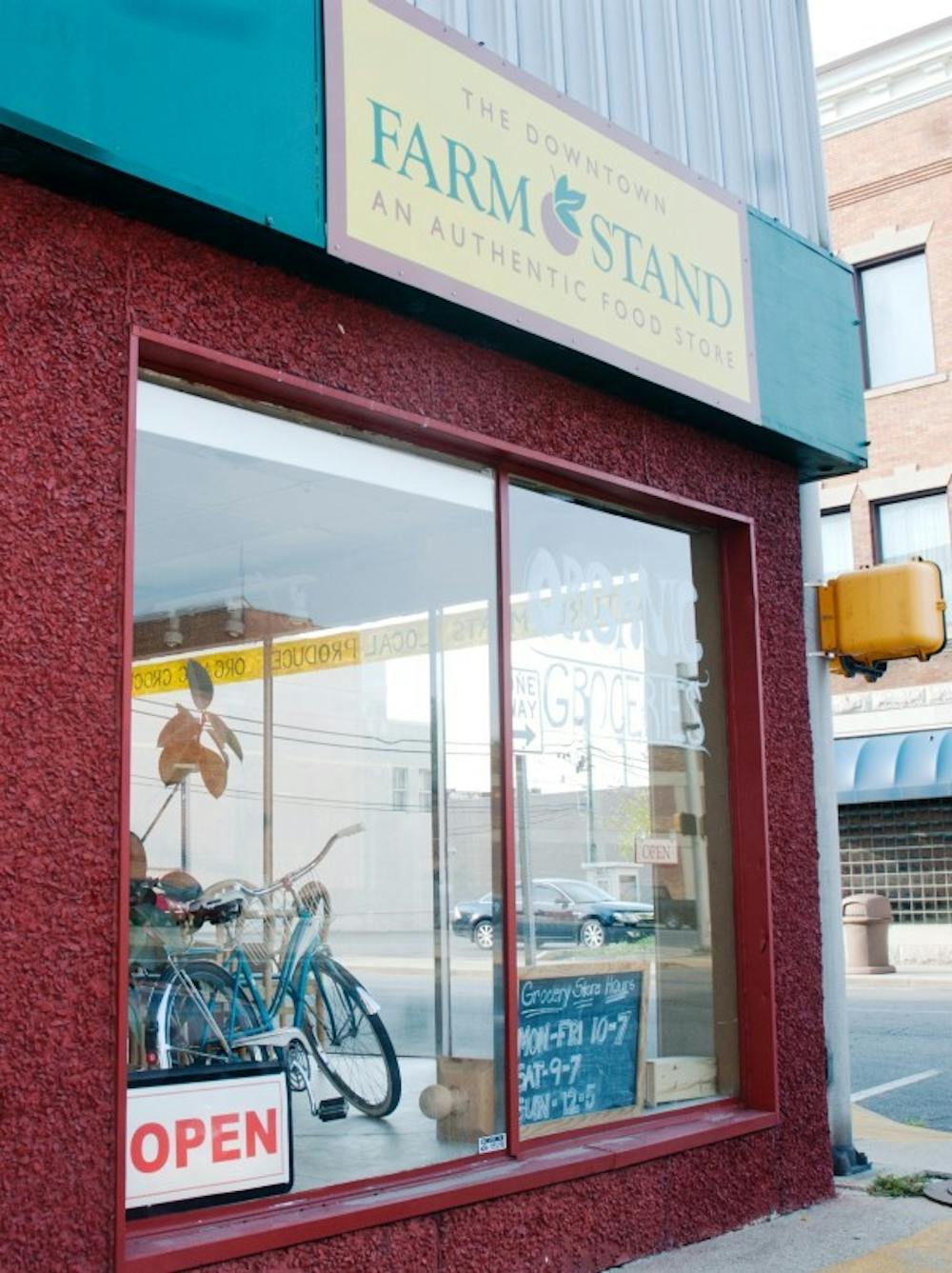You can find a lot of things in downtown Muncie. Bike shops, court houses, banks and theaters. What you may not expect to find sitting on a quaint intersection of Mulberry and East Main streets is an organic food store.
The Downtown Farm Stand, which sits nearly in the center of downtown Muncie, is decorated with window paint advertising its current deals. Plants and wooden furniture can be seen through the windows.
Owner Dave Ring, a Ball State alumnus, and his wife, Sara, moved back to Indiana from California in 1999 in the hopes of helping local farmers get a leg up in selling their products.
The couple first started its mission by selling products at farmers markets and from its own farm. The couple joined Community Supported Agriculture, a group that allows consumers to buy products directly from local farmers.
From there, the Rings created a downtown farmers market, giving them a closer outlet to the Muncie community. The market lasted for three years and eventually led to the opening of the Downtown Farm Stand in May 2007.
Ring said he wanted to return to Indiana to farm because it was cheaper to start a farm in Indiana.
"One big reason [why I moved back] is because I wanted to farm and it's very expensive to get started in a lot of areas," Ring said. "Land prices are reasonable around here, plus I had family and we had ties to this area."
According to Ring, during the time he and Sara moved back to Indiana, there was a great need for an organic food base in the Midwest. He said other parts of the country were already developing in the organic market and felt it was important for someone to initiate an organic move for Indiana.
"I wanted to do it organically and I felt like this area really needed an organic base," Ring said. "Organic was developing on the East Coast and on the West Coast, even in the Northwest, [and] in Michigan and Wisconsin, but it just wasn't developing here at all. So I kind of wanted to help get that going."
Ring realized how difficult it was for farmers to sell their products to corporate stores and said unless there was an easier way, organic farmers would have to spend a great amount of time trying to shop their products to chain stores and risking the chance of no one buying.
"We sold from the farm. We sold to restaurants. We did all that stuff, and the realization came to me that, finally, it just wasn't going to happen for anybody — for the other farmers or anybody — unless there was an easier way to sell your product," Ring said.
Another aspect of farming Ring wanted to be sure to support was sustainability. In agriculture, sustainability means doing little, if any, outsourcing of products other than your own from your farm.
Ring said when a farm is sustainable, everything is produced on site. He said most farms are able to stay sustainable through producing livestock, grazing animals, composting and producing fertilizer, whereas industrial agriculture is completely reliant on off-farm inputs.
According to the Center for Food Safety, an estimated 70 to 75 percent of processed foods that are shelved in supermarkets contain genetically engineered ingredients, making it hard for Ring and other farmers like him to get people to understand the importance of supporting organic and sustainable products.
He said that the cost of the organic food is often times the reason why consumers are reluctant to buy the products.
"Price is probably the biggest marketing challenge that you face on a daily basis," Ring said. "But there are some really simple sayings that I think your grandparents may have told you about that ring true. Number one is ‘you get what you pay for,' and number two, ‘you are what you eat.'
"So if you go for the cheapest food, then that's what you're going to get. You're going to get food that was raised very inexpensively without any care, in the cheapest possible manner, with the least amount of nutrition or food value. So if you're a smart buyer and willing to cook your food, without buying pre-prepared food that costs more money, you're not going to spend much more money eating organically if you're buying ingredients."
Eddie Oliver, a student visiting the Farm Stand from Kansas, said the store, and businesses like it, are a great way to spend his money.
"I very much like the concept behind it," Oliver said. "I think organic grocery stores and restaurants-café's like this are really important, and it's the kind of business I want to support whenever I can."
Ring said the Farm Stand has been a key influence in educating the community about healthier living and the importance of keeping consumerism local. He said the Farm Stand has not only helped farmers with selling their products, but has created a local organic business that has grown a close relationship with its customers.
"We're involved in these people's lives," he said. "Some of them have been supporting me since the farmers markets. ... If it wasn't for the customers — the very loyal customers — we wouldn't be here, because they certainly go out of their way to make us happen."
The Farm Stand provides customers with a variety of services and organic foods specifically chosen by the Rings. Ring said to ensure that he keeps consumer confidence in the Farm Stand, he and Sara go to each farm they buy their products from to make sure all of the products are organic or sustainable.
In the future, Ring said he has thought about expanding the Farm Stand to other places in the country.
"I think it could revitalize downtowns and rural communities all over the country. But, the issue is that whoever's running it has to have a huge passion for it. Otherwise, it just doesn't work," he said.



